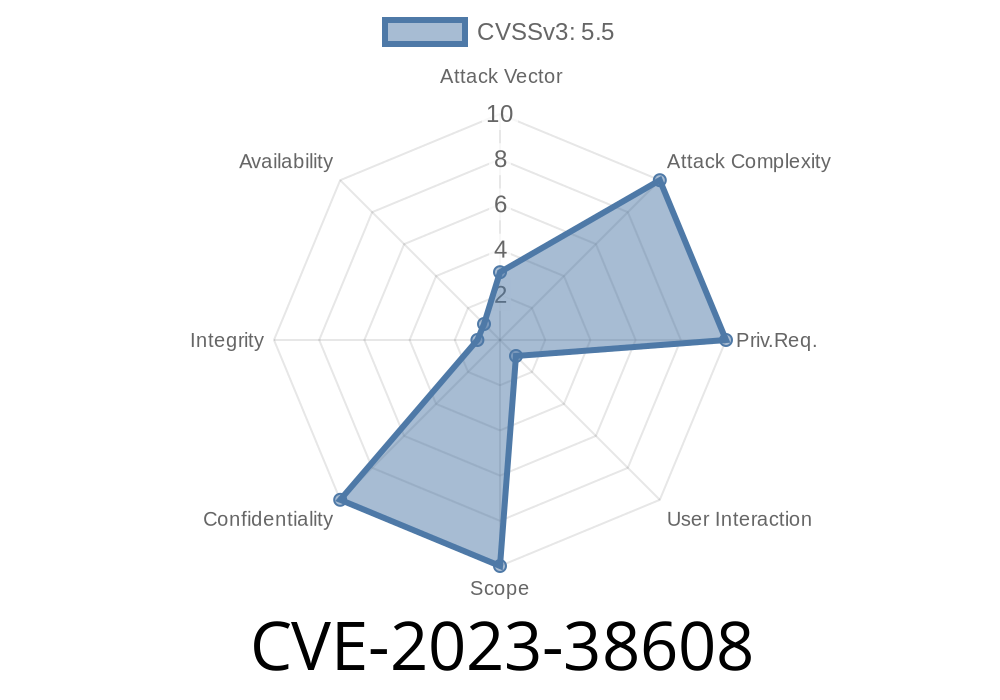In July 2023, Apple patched a serious vulnerability in macOS Ventura, tracked as CVE-2023-38608. This bug could have allowed a malicious app to bypass some security checks and grab your private information without you knowing. In this article, we’ll break down what this vulnerability was, how it worked, show some example code, and explain how Apple fixed it. If you're an Apple user or developer, this is one you’ll definitely want to understand.
What Was the Problem?
The vulnerability existed in macOS Ventura (before version 13.5). According to Apple, “an app may be able to access user-sensitive data.” That means, if someone made a shady app and you installed it, that app could potentially skip around macOS’s built-in privacy protections and grab things it shouldn’t.
The gist: There was a flaw in the way macOS handled permissions checks, specifically for sensitive data requests by apps. A crafty developer could take advantage of this and access private user data without proper authorization.
Apple Security Update:
About the security content of macOS Ventura 13.5
CVE Details:
Technical Details (Explained Simply)
macOS has a robust privacy system. When an app wants to access private stuff (like Contacts, Camera, Calendar, etc.), it has to ask for your permission. The system enforces this with a combination of sandboxing and *permissions checks*.
CVE-2023-38608 was a case where those checks were not thorough enough in a specific macOS component (Apple has not revealed exactly which). That meant an app could *skip* the normal prompt you see, and just go ahead and grab certain bits of sensitive data.
Hypothetical Example
Imagine a malicious app that wants to read your Contacts. Normally, macOS would pop up a warning, and you’d have to click “Allow.” But on affected versions, a flaw let the app access the data directly—no prompt, no warning.
Here’s a simplified code example demonstrating normal (intended) behavior
import Contacts
let store = CNContactStore()
store.requestAccess(for: .contacts) { granted, error in
if granted {
// Safe: User agreed
let keys = [CNContactGivenNameKey, CNContactFamilyNameKey]
let request = CNContactFetchRequest(keysToFetch: keys as [CNKeyDescriptor])
try? store.enumerateContacts(with: request) { contact, stop in
print(contact.givenName)
}
} else {
print("Access denied by user.")
}
}
*The app should always request access and handle denial.*
The Vulnerable Path
With the CVE-2023-38608 issue, an attacker might be able to bypass requestAccess() and jump directly to reading Contacts, Files, or other sensitive resources. Hypothetically (pseudocode):
import Contacts
let store = CNContactStore()
// Vulnerable systems: This might succeed without user approval
let keys = [CNContactGivenNameKey, CNContactFamilyNameKey]
let request = CNContactFetchRequest(keysToFetch: keys as [CNKeyDescriptor])
try? store.enumerateContacts(with: request) { contact, stop in
print(contact.givenName)
}
*On a vulnerable system, this might run silently!*
Who Was At Risk?
Anyone running macOS Ventura 13.4 or earlier who installed an untrusted app—especially outside the App Store—could have been at risk. Fortunately, Apple’s notarization and sandboxing make these attacks hard, but not impossible if someone is tricked into running a malicious app.
Exploit Scenario
A real attacker would package this code in a malicious app, distribute it (say, via a fake productivity tool or pirated app), and once a user ran it, it could:
Help with identity theft, phishing, or targeted scams
This is exactly what privacy permissions are supposed to prevent.
How Did Apple Fix It?
Apple fixed the issue by adding additional permission checks. After July 24, 2023, with the release of macOS Ventura 13.5, the vulnerability was patched. Now, macOS re-checks app permissions more strictly in the affected components, so that the bypass trick doesn’t work anymore.
From Apple’s release notes
CVE-2023-38608: The issue was addressed with additional permissions checks.
Final Thoughts
CVE-2023-38608 is a reminder that no operating system is perfect—even macOS. But with quick security updates, Apple kept real-world risk low. As an end-user, staying up-to-date and being careful what you install remain your best defenses.
Further Reading
- Apple Security Updates (macOS)
- CVE-2023-38608 NVD entry
Timeline
Published on: 07/27/2023 01:15:39 UTC
Last modified on: 08/02/2023 22:25:39 UTC
